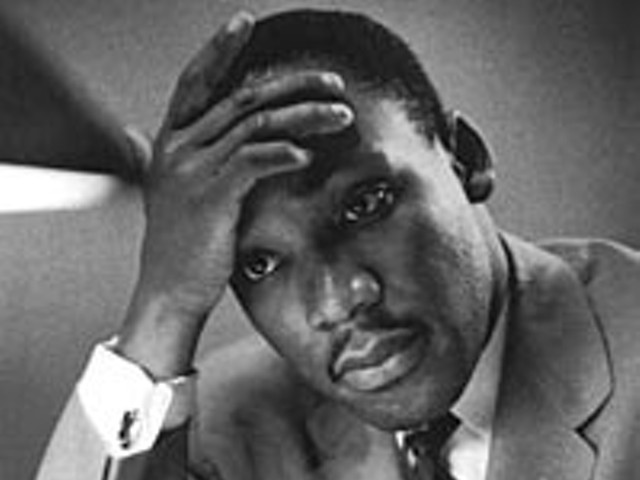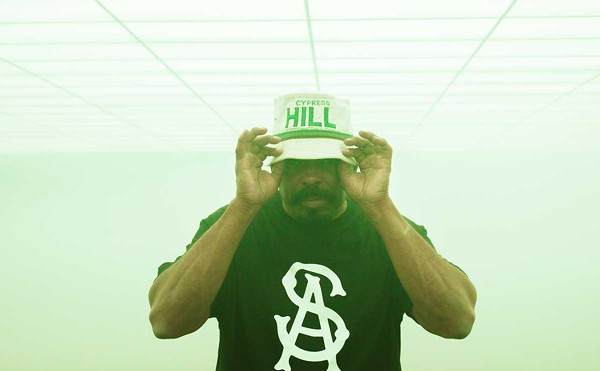Buried deep within the dark, rusting bowels of industrial Detroit, a carnival barker takes the stage and shouts to the freshly seated minions: “We’re gonna destroy a car … we’re gonna destroy ourselves up here tonight.” A couple of people in the back of the room shout, “Fuck yeah!” while the rest take a slug off their plastic cups or a drag off their smokes. The twitchy, rubber-faced ringleader paces back and forth, spitting out one-liners about people not showing up because of traffic jams. He honks a bicycle horn. He introduces his first act by congratulating the performer: “Let’s give him a hand. He walked here tonight.”
The Hastings Street Ballroom is hosting its first Anti-Auto Show tonight, and emcee Bill Boyer is warming up his crowd with a mixture of cornball humor and political diatribe. He smacks a car-shaped piñata with a golf club (a driver, of course) throughout the evening, teasing his audience with a promise that one of them will get to complete its destruction. The tall ceilings and cavernous depths of the ballroom can handle an exploding paper car. It’s a big, black hall that struggles to stay warm throughout the proceedings. Coats are taken off then put back on all night long. It’s concrete and steel and black curtains all around. Tables are about half-full at the start of the show. There’s no line at the bar.
The first act is a spoken-word performer. His name is Zuriel Lott. That name’s got spoken-word performer written all over it, and his subject matter and delivery are perfectly apropos of the genre. He decides to shun the microphone. It’s a mistake. He’s a bit nervous and his words come out soft and tentative. He stumbles a few times, loses his place. It doesn’t matter, though. The ballroom is quiet and attentive and generous.
Zuriel talks about money. He talks about the trivial things we buy with that money. He talks about being a success, about all the things that he could do with some cash. He talks about cell phones and reliable cars and helping out relatives and getting drunk and getting his hands on as much porno as he can find. He talks about a “certain kind of money” that he’ll always turn down. He tosses in the fact that he didn’t vote for our current president. He thinks our current president is dumb. Cars. Money. Phones. Porno. Our president is dumb.
Boyer jumps back onstage and honks his horn and smacks the cardboard car. He’s wearing sunglasses and a baggy suit, and if he hunched his back a bit you’d be looking at a waspy Groucho Marx. Replacing the painted mustache is one enormous chip on his shoulder. He rattles off little bullets about the war and Dick Cheney and cars and oil and body bags all night long. He peppers his monologues with trivia questions about the EPA and global warming. He promises a lucky audience member some bus passes for answering his questions correctly. The crowd eats it up. They shout and laugh and clap. The beer and wine are kicking in.
Michael Jackman is introduced. (Jackman works as a copy editor and writer for Metro Times.) We’re told he’s is a member of the Underground Literary Alliance. He starts off by admitting that he’s “preaching to the choir” before he unleashes a didactic and sobering assessment of our mono-modal transportation system. Jackman details the expenses of automobile ownership: gas, insurance, the spoiling of the land. Why are we so mono-modal? Profits. From raw material to finished product, the car makes a lot of money for a lot of people. Finance companies and advertising companies and the oil industry and the coal industry and a whole bunch of other industries. What can we do about it? Use streetcars and trains and walk. You’ll save the world and “get acquainted with your community” in one fell swoop. Streetcars? Trains? Walk? Good luck, Michael.
David Watson, author of Deep Ecology and Against the Mega-Machine, picks up where Jackman leaves off. Whereas Jackman’s turn on stage was marked by a scientific approach to the problem, Watson’s is couched in poetics and dark apocalyptic imagery. He says he’s not sure whether to start off discussing fascism or the automobile. He reads from his work with his hands in his pockets, calmly and professorially. He talks of “gargantuan banshees” and “kites into the ditch of crows” and “half the world’s workers are paid to kill the other half.” He speaks of the “miserable multitudes” and orphans and harp seals and “Jell-O waterbeds of flesh.” He makes fun of flag-wavers. He reads a poem written for his daughter’s birth that ends, “Somewhere a gull is drowning in oil.” This dude must be a riot at parties.
Boyer dispels the serious and academic tone set by Watson by introducing comedian Beth Short with, “We’re gonna have some women up here, because it will help the show.” Yes. I think it will too. She does some shtick about some nut-job in Hamtramck, her Jewish girlfriend, and a commercial for an anti-hangover remedy. Her contribution to the anti-car theme is a slightly amusing ditty on how many abandoned cars there are on Detroit’s freeways. Her routine is too conversational and loose to be effective. It doesn’t help that she humbly asserted at the start that “I’m gonna try to do something funny.” Confidence, Beth. Confidence. But she’s earnest, full of life and voices, and an excellent break from the heavy propaganda of the first three acts.
The “spoken” part of the show is over, and the rest of the night is devoted to music. Billy West, a tall thin man in longshoreman’s finest, waxes lovingly on his ’68 Ford pickup. “I don’t want to blame cars, man. … We just need to take responsibility.” David Watson is not smiling. West’s voice has a cracked, hillbilly quality to it. “I’m Living In A Fucked-Up World” starts his set. His spare, acoustic guitar-twanging simplicity and folksy, charming delivery enamor him to the almost-full room. Later in the evening, it is he who smacks the piñata with such a blow that it sends chocolate eggs and jawbreakers into the foreheads of the people sitting down front.
An acoustic blues mama named Jessie Ward seems to be an audience favorite. Hoots and catcalls from the audience when she takes the stage. “I haven’t owned a car in seven years. Not because I don’t want one,” she starts off. The “Anti” part of the show seems to be losing some ground. Between songs she asserts that “she does not give head” and “a guitar pick fucking hurts if you’re not used to playing with one.”
Separating this acoustic/folk part of the night and two electric bands — Roshambo and The Brakemen — is a skit performed by our emcee Boyer and his partner in RAT Productions, veteran local actor Leah Smith. RAT Productions are the producers of The Anti-Auto Show. RAT stands for Real Alternative Theatre. They’ve produced plays at Zeitgeist, 1515 Broadway and the ABA theatre. They started eight years ago in the back room of the Third Street Saloon. Their mission is “culturally, socially relevant theater for the city of Detroit.” They specialize in political comedy, such as the Dario Fo play Accidental Death of an Anarchist.
Their skit involves a woman sexually excited by a toy car, the Ted Nugent anthem “Wang Dang Sweet Poon Tang” and a dorky husband riding home to his sweetheart on a child-size Mustang. They eat toy tanks for dinner after the hubby presents his wife with a plastic jug of motor oil. She gets called up to go to war. Sex. Cars. War. It was great to hear that old Nuge chestnut.
Roshambo does a prog-rock set with a lead singer who prances and writhes and buckles and bends all over the stage. A great voice backed by some pretty complicated licks with a generous helping of ripped stockings and underwear thrown into the mix. No songs about automobiles.
The Brakemen start off their blues set with a little story about how Hastings Street, the street where all this talking and folking and political burlesque is going on, was long ago decimated by I-75, thereby destroying the culturally rich Black Bottom district of Detroit. It’s an understated anecdote, yet it packs the most potent anti-auto wallop of the evening.
It’s a pretty big target, the auto industry. It’s also a complicated one. None of the patrons threw their car keys away. No vehicles were torched in the parking lot. We jumped on that freeway that sent Black Bottom packing and were quietly thankful that the heater was still working.
Dan DeMaggio is a regular contributor to Metro Times. E-mail [email protected]




